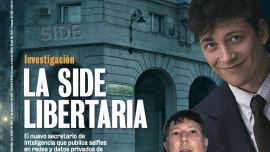Readers well know that in the less than six months since the Covid-19 coronavirus infected its first unwitting human victim in Wuhan it has so far infected close to four million people and killed more than 272,000.
To break the chain of infection the citizens of many nations have been compulsorily quarantined (dubbed “lockdowns”) in time-heavy domestic limbos. It’s no surprise that while Netflix has gained tens of millions of new subscribers many old movies are getting a re-run on dusted-off video and DVD players.
In the depths of tedium this writer unearthed two movies whose titles have an uncanny pertinence in these surreal times.
Sergio Leone’s 1966 spaghetti western, The Good, the Bad and the Ugly, gives us an apt nomenclature to classify how leaders in the Americas’ largest nations have risen to the challenges of the Covid-19 pandemic.
The president of Argentina took immediate and comprehensive action soon after travellers arriving from Italy and Spain sparked infections, while the presidents of Brazil, Mexico and the United States at first claimed Covid-19 is no more dangerous than influenza, then ignored the advice of their public health officials and only, as the pile of corpses became too big to ignore, reluctantly took measures of varying efficacy.
The Brazilian dismissed the virus as a “media hoax,” the Mexican recommended religious talismans to ward-off the virus and the US president resorted to self-aggrandisement and scapegoating.
The Quick and the Dead is the other movie title that resonates, summing up how national leaders who took immediate border control and lockdown measures spared their nations significant trauma, while those who denied and dithered unleashed a tsunami of sickness and death on their people.
Using Sergio Leone’s classifications the winners in each category are clear.
The Good
Argentina’s low infection and mortality rates are laurels of honour for President Alberto Fernández who put his nation’s chronic economic travails to one side, closed its borders and imposed a national lockdown saying in the process: “The choice is to take care of the economy or take care of lives. I chose to take care of lives.”
Fernández said in a recent Times interview that he had not hesitated to impose the lockdown, despite an inevitable increase in poverty. “You cannot return from death but you can bounce back from economic problems” he said.
If anything the Peronist leader’s resolve to eliminate Covid-19 has hardened since he sent Argentines into a “preventative and compulsory” lockdown in mid-March (still in force as a "managed quarantine") with the announcement on April 26 that commercial air travel to, from and within Argentina has been banned until September 1.
The government has announced an aid package for private companies which will pay half of their April wage bills and interest-free loans for six months of up to 150,000 pesos each for the self-employed.
Such largess is remarkable considering Fernández is concurrently struggling to renegotiate the mountain of foreign debt racked-up by his neoliberal predecessor Mauricio Macri, who left Argentina grievously wounded by rampant inflation, a battered currency and on the brink of default.
The Bad
Jair Bolsonaro, Brazil’s homophobic president, and his coterie of unreconstructed fascists and evangelical bishops who claim they can “pray away” Covid-19 all push the line it is no more than a “little flu” and that facemasks are for sissies.
In defiance of data that shows Covid-19 is eight times more contagious than influenza and the need for social distancing, Bolsonaro continues to repeatedly plunge into crowds and dispense hugs and kisses to all and sundry. Bolsonaro has heaped scorn on Brazil’s state governors (particularly those of Rio de Jainero and São Paulo) who took the Covid-19 threat seriously.
Brazil is battling the second biggest coronavirus outbreak in the Americas which did not deter the president from firing his Health Minister, Luiz Henrique Mandetta, because the official had insisted on extolling the pressing need for lockdowns and greater testing.
Mandetta also sinned when his approval ratings in a national opinion poll overtook Bolsanaro’s by a large margin which, in accordance with Trumpian doctrine, doubly guaranteed the axe would fall swiftly on Mandetta’s neck, as indeed it did within days of the poll results.
Former president Luiz Inácio Lula has branded Bolsonaro a “troglodyte” who is “trying to lead society to the slaughterhouse” and called for his impeachment on the very same day Bolsonaro personally led a demonstration calling for businesses to reopen.
Brazil’s efforts to lessen the economic impact of the crisis has been an emergency support package of US$223 billion which includes support for the poor, workers, local governments and business as well as the health sector but only about 25 percent of the package is new money.
Our other contender is Andres Manuel Lopez Obrador (AMLO), Mexico’s famously tactile president who has continued to plunge into crowds, hugging, kissing, shaking hands with thousands (including drug-lord El Chapo’s nonagenarian mother) while urging Mexicans to “live life as normally as possible.”
AMLO’s unorthodoxy is well known and perhaps best represented by his strategy to fight murderous drug-cartels with “hugs not bullets” which has seen kidnappings, torture and decapitations go through the roof with a record high of 34,500 homicides in 2019.
Mexico’s president has had his fingers crossed from the very beginning of the pandemic, hoping against hope that Covid-19 would not become a problem. After Covid-19 infections and deaths began to rise alarmingly AMLO was forced to change his tune and endorsed lockdowns which have caused widespread economic hardship.
His hands-off approach has cost him in approval ratings. AMLO said on April 19 that “no sick person will be left without a ventilator, the most important thing is life,” which was pure, unadulterated flannel as the authorities haven’t a clue how many infections there are in Mexico, as unlike every other nation in the Americas its citizens have to pay for the Covid-19 test (3,500 pesos). The 40 percent of the population who live below the poverty line – the most vulnerable to Covid-19 – cannot afford the test and will only know they are infected if and when they succumb, having in the interim infected who knows how many others.
After much prodding from his own ministers and NGOs, AMLO announced a US$26-billion shift in social spending (to be funded by increased austerity), which many critics say is too little, too late, and a measly aid programme worth US$2.5 billion, which will provide three million loans to support small businesses.
The Ugly
When the first case of Covid-19 reached the United States, Donald Trump pooh-poohed the danger. On January 22, he told CNBC: “We have it totally under control. It’s one person coming in from China.” Then, as infections started to rise, he claimed the virus would “disappear like magic” in warmer weather.
Trump squandered the opportunity to prepare by ignoring an avalanche of advice from his intelligence agencies that Covid-19 could become a pandemic. But he did find time to publicly praise China’s handling of their coronavirus outbreak and downplay its threat to the US. Once the seriousness of the outbreak became apparent the worm turned and Trump characterised Covid-19 as a “Wuhan Virus,” blaming China for the epidemic.
The shallow pool of talentless sycophants surrounding Trump have proved themselves incapable of devising a coherent federal response to the epidemic, although this should come as no surprise as Trump’s asinine son-in-law, Jared Kushner – who is as vindictive and myopic as Trump himself – has been put in charge of the US coronavirus response and established his own shadow taskforce made up of equally unqualified friends.
On the day World Health Organisation (WHO) declared Covid-19 a pandemic, Kushner advised Trump against declaring a national emergency which would have freed-up funding and resources for states because it would “tank the stock market.” The market tanked anyway, only days later, at which point Trump was forced to declare the emergency.
Trump is chaffing to reopen the economy against health officials’ advice on the grounds “the cure cannot be worse than the problem itself,” as he claims without evidence that “more people would die from a weak economy than from a pandemic.”
The director of the US National Institute of Allergy and Infectious Diseases, immunologist Dr. Anthony Faucci, is one of the very few competent officials in Trump’s orbit. He said in late April that the US is nowhere near the scope and scale of testing needed to move away from social distancing, which has undermined his standing with Trump.
The US assistant secretary of health in charge of testing, Admiral Brett Giror, is another official on wafer-thin ice for telling media outlets “we are never going to be able to do five million tests a day as it is not feasible given current technology.” Trump had claimed on 28 April the US would soon reach five million Covid-19 tests a day – at that point, the most tests accomplished in a day was 314,182.
Trump’s description of Covid-19 as “a brilliant virus which has gotten so clever that antibiotics can’t keep up with it” sums up his ignorance, as does his suggestion that Covid-19 victims could be injected with disinfectant or bleach, not to forget the conspiracy theories and unproven miracle cures he’s promoted.
More than 26 million workers have become unemployed despite rescue packages worth over US$2 trillion, which principally lined the pockets of big corporations and banks. The paltry US$1,200 sent to each citizen (via a cheque bearing Trump’s signature) did not include the 15 million citizens who are married to immigrants, nor did it reach those workers who are behind on rent after losing their jobs.
The crowning glory of Trump’s appalling response to the pandemic has been his decision to freeze Washington’s funding of the WHO, just as Covid-19 gathers steam (particularly in his own nation, Africa and Latin America), on the grounds the WHO has become a slave to Chinese interests.
While there are valid questions to be answered around China’s role in the genesis of the pandemic, Trump’s timing is breathtakingly inopportune, though not surprising given the US has made zero contributions to the WHO’s Pandemic Fund since Trump came to power. He also personally intervened in late April to cut federal funding to the EcoHealth Alliance, an organisation which does research on virus transmission between bats (the presumed Covid-19 host) and humans.
To add insult to injury, Trump is proposing to cut the Centre for Disease Control’s 2020 budget by US$1.3 billion (20 percent) on top of the significant cuts he made in 2019 which included removing CDC officials who were based in China to monitor the outbreak of infectious diseases.
The Quick and the Dead
The “Quick” are those leaders who took decisive action. In this, Argentina is a shining exemplar of the benefit of timely border closures and comprehensive social distancing as its very low rates of infection and mortality attest.
The “Dead” are those poor souls who perished from an unnecessary spread of infection occasioned by fools and charlatans who minimised Covid-19’s threat and whose happy talk about herd immunity were all no more than fiddling while Rome burnt.
Equally there are the deaths caused by hard-hearted, hubristic leaders who don’t give a fig if Covid-19 kills thousands of their people, as long as business as usual is not interrupted and who delayed meaningful action at deadly cost.

























Comments